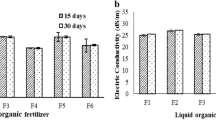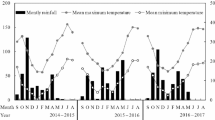Abstract
This study was conducted to determine the long-term performance under two farming systems of Capia pepper, a summer vegetable in high demand, consumed fresh, as paste, dried, or roasted. The trial was conducted for 9 years on certified organic and conventional plots of Ege University, İzmir, Turkey. In both farming systems, pepper was the main summer crop, but the preceding crop varied between the farming systems and over the years. Certified organic seeds and seedlings of Yalova yağlık-28, an open pollinated variety, were used for Capia pepper production. Yields were statistically similar in the conventional (45,217 kg ha−1) and organic (43,645 kg ha−1) systems; however, significant yield variations occurred with respect to the annual conditions. The farming system significantly influenced fruit quality. The average fruit weight was 99.7 g in the conventional plots compared with 88.8 g in the organic. The fruit pericarp was thicker in the organic (5.1 mm) than in the conventionally grown ones (4.5 mm). The L-ascorbic acid content was (73.4 mg 100 g−1) higher in the conventional fruit, whereas the total soluble solids (7.7%) and red pulp color, determined by a chromameter, as a*/b* (2.0), were more pronounced in fruit from the organic plots. The long-term trial showed that organic management helped to improve the soil organic matter content and fruit quality, especially from the perspective of processing.
Similar content being viewed by others
References
Aksoy U, Tüzel Y, Altındişli A, Can HZ, Onoğur E, Anaç D, Okur B, Çiçekli M, Şayan Y, Kırkpınar F (2005) Organic farming practices. Turkish Agriculture Engineering VI. Technical Cong., 291–314. Ankara
Al Chami Z, Hmid A, Baysal D, Amer N, Al Bitar, L, Aksoy U (2013) Evaluation of pre-crops and organic fertilization program on the subsequent crop under Mediterranean conditions: case of South of Italy. Geophysical Research Abstracts Vol. 15, EGU2013–14079-1, 2013 EGU General Assembly 2013 © Author(s) 2013. CC Attribution 3.0 License
Anonymous (2010) Organik Tarımın Esasları ve Uygulamasına İlişkin Yönetmelik. T.C. Resmi Gazete, Tarih: 18.08.2010, Sayı: 27676, Ankara
Anonymous (2015a) Turkish Statistics Agency (TUIK), accessed December 2015
Anonymous (2015b) Organic agriculture statistics for 2013, Ministry of Food, Agriculture and Livestock of Turkey (www.tarim.gov.tr) accessed December 2015
Atalay İZ, Kılınç R, Anaç D, Yokaş İ (1986) Gediz havzası rendzina topraklarının potasyum durumu ve bu topraklarda alınabilir potasyum miktarlarının tayininde kullanılacak yöntemler. Bilgehan Matbaası, İzmir, 25p
Bingham FT (1962) Chemical soil tests for available phosphorus. Soil Sci 94:87–95
Bremner JM (1965) Total nitrogen in black, C.A. (ed.) methods of soil analysis, part 2. American Society of Agronomy Inc., Publisher, Madison, Wisconsin, USA, pp 1149–1178
Chellemi DO, Rosskopf EN (2004) Yield potential and soil quality under alternative crop production practices for fresh market peppers. Renew Agr Food Syst 19(3):168–175
Del Amor FM (2006) Yield and fruit quality response of sweet pepper to organic and mineral fertilization. Renew Agr Food Syst 22(3):233–238
Duman İ, Elmacı ÖL (2014) The effects of combined pre-crops paste pepper (Capsicum annum L. cv. Capya) production on yield and soil properties under long-term organic conditions. Ege Üniv Ziraat Fak Derg 51(3):289–296
Duman İ, Altındişli A, Aksoy U (2010) The effects of long-term growing of organically grown processing tomatoes (Lycopersicon lycopersicum L. cv. Rio Grande) on fruit yield and paste output. Turkey IV. National Organic Agriculture Symp 28 :189–194June-1 July 2010, Erzurum
Duxbury JM, Smith MS, Doran JW (1989) Soil organic matter as a source and sink of plant nutrients. In: Coleman DC, Oades JM, Uehara G (eds) Dynamics of soil organic matter in tropical ecosystem. USA, University of Hawaii Press, pp 33–67
Jackson ML (1967) Soil chemical analysis, prentice hall of India private. Limited, New Delhi
Osma E, Serin M, Leblebici Z, Aksoy A (2012) Heavy metals accumulation in some vegetables and soils in Istanbul. Ecology 21(82):1–8
Reganold JP, Andrews PK, Reeve JR, Carpenter-Boggs L, Schadt CW, Alldredge JR et al (2010) Fruit and soil quality of organic and conventional strawberry. Agroecosystems. PLoS One 5(9):e12346. doi:10.1371/journal.pone.0012346
Reuterberg E, Kremkus F (1951) Bestimmung von gesamthumus und alkalischen humusstoffen im boden. Weinheim, Z. Pflanzenernaehr. Düng. und Bodenkd. Verlag Chemie GmbH
Sillanpaa M (1990) Micronutrient assessment at the country level: a global study. FAO Soils Bulletin 63. Food and Agricultural Organization of the United Nations, Rome
Thorup-Kristensen K, Dresbøll DB, Kristensen HL (2011) Crop yield, root growth, and nutrient dynamics in a conventional and three organic cropping systems with different levels of external inputs and N re-cycling through fertility building crops. Eur J Agron 37:66–82
Thybo AK, Edelenbos M, Christensen LP, Sorensen JN, Thorup-Kristensen K (2006) Effect of organic growing systems on sensory quality and chemical composition of tomatoes. Food Sci Technol Int 39(8):835–843
Toor RK, Savage GP, Heeb A (2006) Influence of different types of fertilizers on the major antioxidant components of tomatoes. J Food Compost Anal 19:20–27
Ünlü H, Padem H (2009) Effects of farm manure microbial fertilizer and plant activator uses on yield and quality properties in organic tomato growing. Ecology 19(73):1–9
Vural H, Eşiyok D, Duman İ (2000) Kültür sebzeleri (Sebze Yetiştirme). Ege Üniversitesi Yayınevi, Bornova-İzmir, Turkey 440p
Willer H, Lernoud J (2015) World of organic agriculture. Statistics and emerging trends 2015. FIBL, Frick and IFOAM-Organics International, Bonn
Acknowledgements
The project was supported partially by the Governorate of Izmir, Izmir Provincial Environment and Forestry Directorate and Izmir Environment and Forestry Foundation.
Author information
Authors and Affiliations
Corresponding author
Rights and permissions
About this article
Cite this article
Duman, İ., Aksoy, U., Altındişli, A. et al. A long-term trial to determine variations in the yield and quality of a processing type pepper (Capsicum annuum L. cv. Yalova yağlık-28) in organic and conventional farming systems. Org. Agr. 8, 69–77 (2018). https://doi.org/10.1007/s13165-016-0174-2
Received:
Accepted:
Published:
Issue Date:
DOI: https://doi.org/10.1007/s13165-016-0174-2




